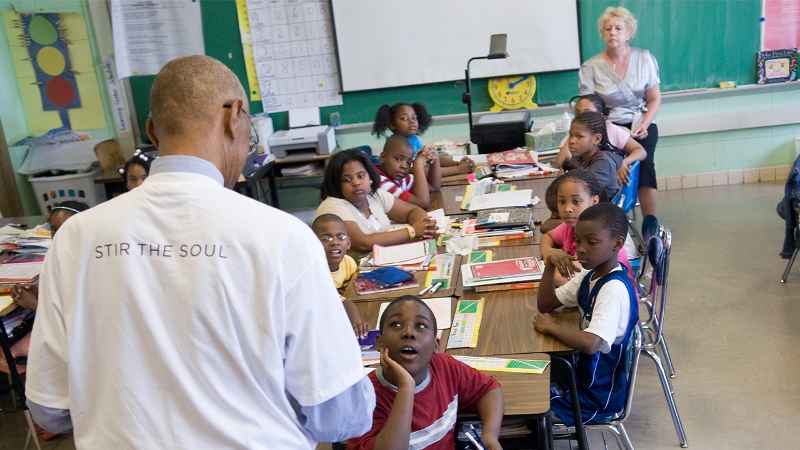Boost Your Child’s Confidence with Primary Science Tuition Singapore
Boost Your Child’s Confidence with Primary Science Tuition Singapore
Blog Article
Checking Out the Various Mentor Approaches in Key Science Education And Learning Today
The landscape of primary science education is progressing, with various mentor strategies gaining prestige in contemporary classrooms. Inquiry-based understanding, hands-on experiments, and the integration of modern technology are redefining exactly how instructors engage young minds. Additionally, collective strategies and set apart instruction are being utilized to satisfy the varied requirements of pupils, enhancing both interaction and understanding. As we check out these methodologies, questions arise regarding their efficiency and the effects for future academic practices. What might these shifts in method mean for the future generation of students?
Inquiry-Based Knowing
Inquiry-Based Discovering (IBL) is a pedagogical method that encourages students to check out scientific concepts through wondering about, investigation, and hands-on testing. This approach highlights the function of trainees as active individuals in their learning, advertising crucial thinking and problem-solving skills. By involving with real-world inquiries, pupils become interested and inspired, which enhances their understanding of scientific concepts.
In IBL, instructors serve as facilitators, guiding students as they browse their questions instead of delivering info straight. This student-centered technique enables for distinction, fitting different discovering paces and designs. Trainees establish abilities in developing hypotheses, making experiments, and examining information, which are vital for scientific proficiency.
Additionally, IBL cultivates cooperation among pupils, encouraging them to share searchings for and ideas. This cumulative query advertises social abilities and a feeling of community within the class. The process of inquiry motivates durability, as students find out to embrace failure as a tipping stone towards understanding.
Hands-On Experiments
Hands-on experiments are an important part of effective scientific research education, enhancing the concepts of inquiry-based understanding. These experiments enable pupils to involve directly with clinical principles, fostering a deeper understanding through experiential knowing. By controling products and observing results, young students can grasp abstract concepts in substantial ways.
Such tasks advertise crucial thinking and analytical abilities, as pupils hypothesize results, conduct experiments, and evaluate results. This process urges them to ask concerns, improve their understanding, and establish a clinical mindset. Hands-on experiments can be tailored to diverse discovering styles, guaranteeing that all trainees have the possibility to involve meaningfully with the web content.
Moreover, hands-on experiments often encourage partnership among peers, promoting teamwork and communication abilities. Functioning in teams makes it possible for pupils to share concepts, go over searchings for, and pick up from one an additional, which improves their general academic experience.
Integrating hands-on experiments into the main science educational program not just improves the finding out atmosphere but additionally grows a long-lasting rate of interest in science. By proactively taking part in their education, students are extra most likely to develop an interest for clinical query that extends past the classroom.

Innovation Assimilation
Incorporating technology into key science education has ended up being significantly vital in cultivating student interaction and boosting finding out end results. Using digital devices, such as interactive simulations, online laboratories, and instructional software application, gives pupils with opportunities to explore scientific concepts in ingenious ways. These sources facilitate a deeper understanding of complicated topics by enabling learners to imagine and manipulate variables that would be unwise in a standard classroom setting.
Furthermore, modern technology combination motivates customized learning experiences. Students can proceed at their own pace, revisiting tough principles with multimedia sources, which provide to various discovering styles. This adaptability not just sustains private growth yet additionally cultivates a sense of freedom in learners.
Additionally, modern technology works as a bridge to real-world scientific research, connecting trainees with current research and expert payments. Access to clinical journals and on the internet databases widens trainees' perspectives on clinical inquiry and cultivates crucial assuming skills.
Collaborative Knowing
Joint discovering plays an important role in primary scientific research education and learning by promoting teamwork and interaction skills among pupils. This approach urges students to work with each other, share expertise, and participate in analytic, which boosts their understanding of scientific principles. By joining group tasks, students discover to express their ideas, pay attention to diverse viewpoints, and negotiate options, every one of which are vital skills in both real-world and scholastic contexts.
:max_bytes(150000):strip_icc()/GettyImages-595348697-5b356e9ac9e77c00372d12a8.jpg)
Research i loved this shows that collective learning can cause increased motivation and involvement in science topics, as students discover satisfaction in shared experiences (primary science tuition Singapore). Furthermore, this method prepares pupils for future collaborative ventures, outfitting them with the skills required for reliable team effort in college and expert settings. Eventually, embracing collaborative learning in key science education can considerably enrich the knowing experience and advertise a deeper understanding of clinical query
Differentiated Guideline

Distinguished guideline can show up in various methods, such as varying the web content, processes, or products of learning. Educators might use tiered assignments that supply varying levels of complexity, permitting pupils to function at their corresponding preparedness levels. Furthermore, flexible grouping methods can promote cooperation amongst trainees with different abilities, promoting peer learning.
Evaluation plays an essential role in this approach, as it notifies instruction and helps instructors understand each pupil's distinct demands. Developmental evaluations, such as tests and monitorings, can lead instructors in changing their techniques to enhance learning outcomes. primary science tuition Singapore. Ultimately, by applying distinguished instruction in primary science education, instructors can cultivate a more efficient and fair learning environment, encouraging all students to reach their complete potential in comprehending clinical phenomena
Conclusion
In recap, the diverse mentor techniques in primary scientific research education, consisting of inquiry-based discovering, hands-on experiments, innovation integration, collaborative understanding, and separated instruction, jointly add to an extra reliable learning setting. These approaches promote essential reasoning, analytical abilities, and a much deeper comprehension of scientific concepts. By applying these approaches, educators can read more produce appealing and supportive classrooms that attend to the varied requirements of trainees, eventually fostering a lifelong passion in science and improving academic accomplishment.
Inquiry-Based Knowing (IBL) is an instructional approach that urges pupils to check out scientific principles via wondering about, investigation, and hands-on trial and error.Collective understanding plays an important duty in key scientific research education by fostering team effort and communication skills amongst pupils.Research indicates that collaborative discovering can lead to enhanced inspiration and involvement in science subjects, as students locate pleasure in common experiences.In cultivating an inclusive discovering environment, distinguished instruction emerges as a crucial method to suit the diverse demands and anonymous capabilities of trainees in main science education and learning. Ultimately, by executing set apart instruction in main science education, instructors can grow a much more fair and effective understanding environment, empowering all students to reach their complete potential in recognizing clinical phenomena.
Report this page